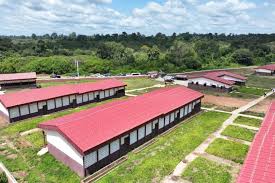
Ivory Coast’s modern college of Affalikro, located 12 kilometres from Abengourou, is set to become a fully-fledged high school thanks to support from the agricultural cooperative Niamké et frères de l’Indénié (Scanfi) and its partner Puratos.
On Tuesday, 23 September 2025, the cooperative announced plans to finance the construction of two new buildings at the college, enabling the gradual introduction of upper-level classes from the next academic year.
The project, expected to take six months, has a total cost of 67 million CFA francs.
“These infrastructures will allow the establishment to welcome its first Seconde class and gradually set up Première and Terminale classes,” said Secretary General Ahon Kouakou N’Drama Louis.
He added, “Once this first class of final year students has passed the baccalaureate exam, the establishment can be officially recognised as a high school by the Ministry of National Education.”
The move was praised by the Regional Director of Education and Literacy, Coulibaly Apa Patrice, who highlighted the civic engagement of Scanfi and Puratos in supporting local education.
The college, which opened in October 2021 as part of the government’s Rapid Impact of the Regions (PI2R) programme, currently has an enrollment of 562 students. For its first participation in the BEPC exam this year, it achieved a success rate of 84%, topping the regional rankings.
“The students who go to Seconde are currently forced to leave their parents and travel to Niablé or Abengourou, where they often have no tutor,” said Principal Houan Dégbo Ferdinand, stressing the importance of the upgrade for the local community.
Built on four hectares, the modern college currently includes two buildings with eight classrooms, accommodating grades six to nine.
The new construction will mark a major step in reducing the long journeys students previously faced, some travelling over 20 kilometres daily to reach schools in neighbouring towns.
The same day, Scanfi inaugurated a fully equipped six-classroom school with a teacher’s office, eight latrine blocks, and a canteen in Amélékia, while also laying the foundation stone for another school in N’Zébénou, demonstrating the cooperative’s ongoing commitment to rural education.



